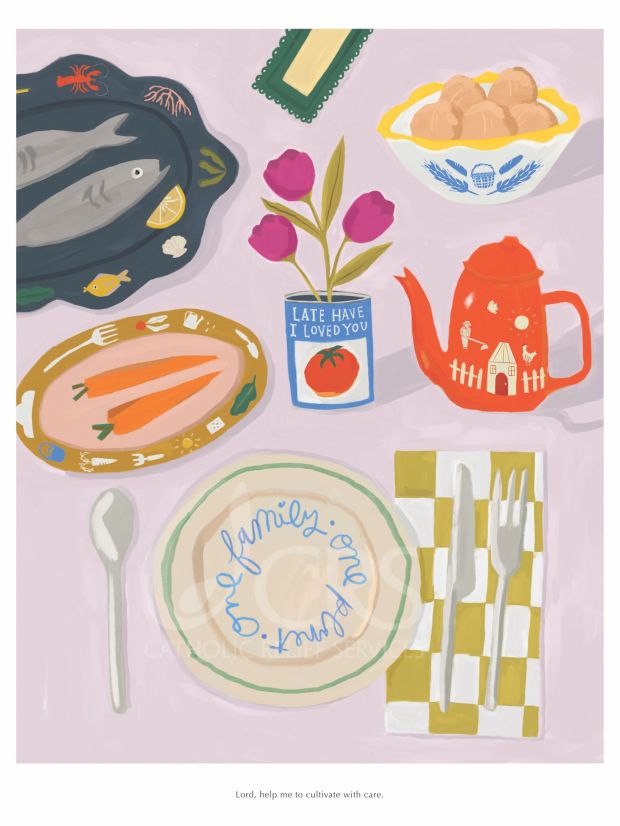Pope Francis is known for frequently speaking about caring for the planet, even though it was really his predecessor, Benedict XVI, who was known as the "Green Pope."
But for most of us sitting in the pews, the idea of a climate crisis can seem distant.
Yet the Church calls us to be “stewards of the earth,” who protect and care for natural resources.
As Pope Benedict XVI wrote, "The environment is God's gift to everyone, and in our use of it we have a responsibility towards the poor, towards future generations, and towards humanity as a whole."
Recently I had the chance to catch up with Erica Tighe Campbell, a Catholic artist and writer. Much of her work celebrates the environment and God's call to us to care for it.

She has partnered with Catholic Relief Services to create a beautiful print in honor of Earth Day. Proceeds from the illustration will go toward supporting the initiatives of Catholic Relief Services (CRS).
“CRS reached out to me to see if I would be interested in creating a piece that could depict their climate change initiatives,” Campbell told me. “So many of us only think of the environment when we talk about climate change, but really it is that climate change affects people and usually those who are already the most vulnerable are affected the most.”
Why is it important to Campbell to celebrate Earth Day as a Catholic? “In caring for our Earth, we are caring for each other,” she said. “In our dignity for all, we all deserve shelter for our families and food on our tables — something we all too often take for granted. The work that CRS is doing on the ground to help with long-term solutions is amazing.”
The illustration is filled with thoughtful little details, and I asked Campbell to explain the meaning behind them. Here’s what she told me.

I chose to illustrate a dinner table because it is a sacred, safe place in our homes and for our families. It is where we are nourished, where we pray as a family and where we connect with each other. But a full dinner table is not a certainty for all. As climate change affects our world, those who have contributed the least to the climate crisis are impacted the most. For some, food resources are diminished — higher temperatures are changing the farming seasons. Crops and soil are ruined by flooding. For others, their shelters are wiped out by climate disasters.
On the table are different foods that relate to the initiatives Catholic Relief Services provides — through the generosity of supporters—to help families and communities learn to adapt to the effects of climate change. On the dishes are motifs of elements on our planet that we must care for.
The plate says “One planet. One family” — the motto of CRS’s initiatives around the climate crisis.
The fish relate to a family in the Philippines. For years, an elderly couple worked hard as coconut farmers. Periods of heavy rain caused flooding, making farming difficult. In a CRS program, they received training and assistance to build their own fishpond. They bought little fish to stock the pond, fish food and a net. The fish grew bigger, and soon they were able to sell them at the market. The fishpond also provided food for their family so they could enjoy nutritious meals together.
There are carrots to represent the young man in Bangladesh who decided to grow and sell vegetables to help support his family. Bangladesh experiences an intense monsoon season every year, which causes flooding and destroys farms and crops. His home is in a lowland, and flooding is a regular and disastrous occurrence. The monsoons are becoming more frequent and severe, making it difficult to farm and earn an income. In a CRS training, he learned how to protect his plants from flooding by putting them on raised beds and how to make and use organic fertilizer to grow healthier crops.
The basket of bread relates to a story of a middle aged father of five in Honduras. Rising temperatures, erratic rainfall patterns and recurrent drought have pounded the Dry Corridor, a strip of territory that runs through Guatemala, El Salvador, Honduras and Nicaragua, in recent years, depleting harvests and leaving millions hungry. He said that he planted but could not harvest due to a lack of water and that the temperatures dried out their plants. With a program implemented by CRS, he built a water reservoir and drip irrigation system. Now, he collects rainwater during the wet, winter months in the reservoir and delivers that water directly to the roots of his plants during the hot, dry summer months. He can now bring precious food to his family and community.
On the teapot is a little family farm, which relates to a story of a family in Kenya. Most people in this area raise livestock such as goats and camels, and a few are farmers. They rely on rain and river water to irrigate their crops and feed their animals. But it is raining less and less in Turkana, and—when it does rain—it can be unpredictable and intense, leading to floods that wash away the seeds. They participated in a Catholic Relief Services program that installed a water well in their village and trained them in new farming techniques and they have now become leaders in their community.
On the tomato can it says, “late have I loved you,” which is a nod to St. Augustine, but is also relevant to how we are all late to loving the Earth. As Pope Francis says in Laudato Si’, “Our relationship with the environment can never be isolated from our relationship with others and with God.”
Check out Campbell’s print for a simple and beautiful way to help the planet through supporting Catholic Relief Services’ initiatives this Earth Day.



